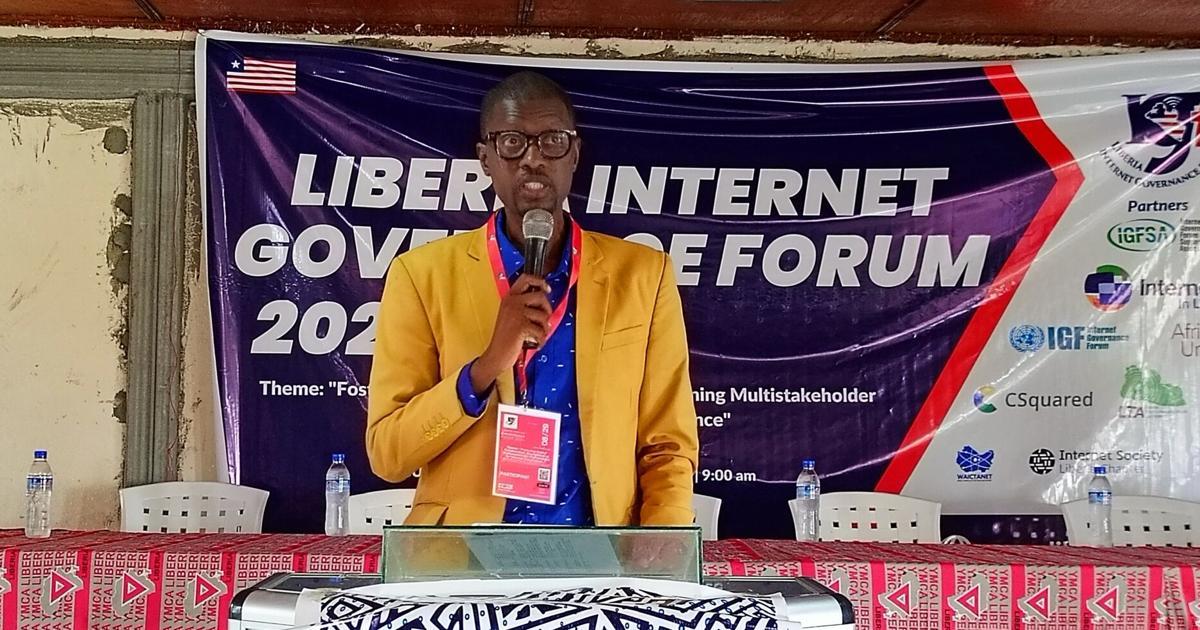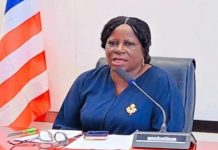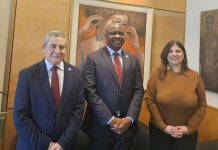Africa-Press – Liberia. — A call to action for national growth in the 21st Century
At the recent International Governance Forum (IGF), Dr. Mory Sumaworo, an academic and entrepreneur, delivered a powerful address on the digital challenges facing Liberia and the critical need for a strategic forward-looking approach.
Dr. Sumaworo, who serves as a faculty member at Cuttington University Graduate School of Global Affairs and Policy, AMEU Graduate School, and CEO of GBI Group, underscored the critical digital gap that threatens to hinder Liberia’s growth in an increasingly interconnected world.
In his speech, Dr. Sumaworo emphasized the rapid global shift towards digital integration, with information technology (IT) and information and communication technology (ICT) becoming integral to every facet of life, ranging from business, leadership, education, communication, governance, healthcare, and beyond. Despite this global trend, Liberia remains significantly behind in its digital adoption.
“There remains a significant gap between highly digitalized nations and those lagging in technology, including Liberia,” Dr. Sumaworo noted. “This gap exacerbates socioeconomic disparities between these two ends of the spectrum. Economic development is slowing in many of the least technologically advanced countries, including Liberia, due to their sluggish migration towards and adoption of the digital innovations that are essential for economic and developmental progress.”
Dr. Sumaworo cited the United Nations E-Governance survey and global Internet Protocol (IP) traffic statistics to illustrate the pace of global digital transformation. He noted that global IP traffic, a key indicator of data flow, increased from around 100 gigabytes (GB) per day in 1992 to over 45,000 GB per second by 2017. By 2022, global IP traffic had surged to 150,700 GB per second, driven by the growing number of internet users and the expansion of the Internet of Things (IoT).
He further emphasized that the global digital economy is on track to reach $25 trillion within the next five to six years, outpacing the growth of global GDP. However, Liberia’s digital landscape remains underdeveloped, as evidenced by the February 2024 Data Reportal, which reveals the following sobering statistics: Internet Users: 1.65 million, with a penetration rate of just 30.1%; Social Media Users: 859,000, accounting for 15.7% of the population; and Mobile Connections: 4.77 million active connections, representing 87.1% of the population.
In stark contrasts, Dr. Sumaworo pointed out, Singapore, a country with a similar population size than Liberia’s’, but which boasts an internet penetration rate of 96%, social media usage at 85.1%, and 9.78 million active mobile connections—equivalent to 162.2% of its population. Globally, there are 5.44 billion mobile phone users, 5.16 billion internet users, and 4.76 billion active social media users out of a total population of 8.1 billion.
Dr. Sumaworo also referenced the 12th edition of the United Nations E-Government Development Index (EGDI), which ranks Liberia 177th out of 193 countries. This low ranking underscores the urgent need for Liberia to enhance its digital infrastructure and governance systems to foster socioeconomic development and ensure effective governance.
He stressed that Liberia must invest in both software and hardware infrastructure to accelerate growth and compete in the global digital economy. “It is not enough to increase internet penetration; the quality of digital usage must be prioritized through up-to-date training, creativity, and innovation. Only then will Liberia fully realize the economic and social benefits of IT and ICT,” he urged.
He stated that the forum’s theme highlights three critical areas for discussion concerning Liberia’s digital future: the current policy landscape, digital transformation and governance, and future policy directions.
The Liberia Internet Governance Forum, held on Thursday, August 29, 2024, at the Liberia YMCA conference hall in Monrovia, was themed: “Fostering Digital Collaboration: Strengthening Multistakeholder Partnerships for Internet Governance.”
Dr. Sumaworo emphasized that Liberia’s digital policy landscape is shaped by both external and internal influences. “Externally, global initiatives such as the 2005 Tunis Agenda, the UN’s Global Digital Compact, and the Digital Transformation Strategy for Africa provide frameworks for digital governance. Internally, national policies, including the 1986 Constitution, the Telecommunications Act of 2007, and the National ICT and Telecommunications Policy (2010–2015), guide Liberia’s digital transition.”
He called for a transformation in Liberia’s digital governance to make it more competitive, efficient, and market-driven. Despite some progress since 1999, challenges remain, including high internet costs and slow service speeds. E-transactions, e-learning, and e-commerce are still developing, indicating a need for further investment in digital infrastructure.
“To prepare for the ongoing Digital Revolution, Liberia must adopt the following policy measures: enact laws and policies supporting e-transactions, consumer protection, privacy, cybersecurity, and digital entrepreneurship; integrate market-driven digital skills into the national curriculum; establish IT and ICT incubation centers nationwide; promote research in digital technologies; and ensure that digital freedoms do not compromise national security,” he stressed.
Dr. Sumaworo concluded by stating that the digital economy is a key driver of 21st-century growth, and Liberia must create an enabling environment for tech entrepreneurship and innovation. This involves establishing a dedicated department within the government to capitalize on digital opportunities.
In his final remark, he reiterated that the internet and digital technologies are reshaping the world, offering immense potential for economic growth and societal development. “It is imperative that Liberia seize this opportunity to build a prosperous future.”
He urged the government of Liberia and the private sector to act swiftly to bridge the digital divide and position Liberia as a competitive player in the global digital economy.
For More News And Analysis About Liberia Follow Africa-Press






